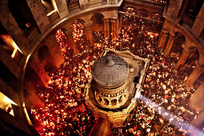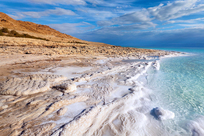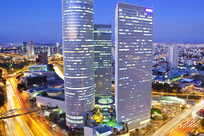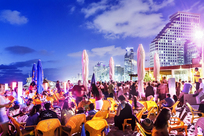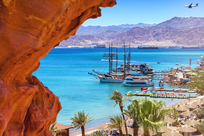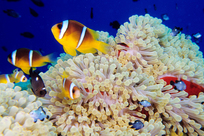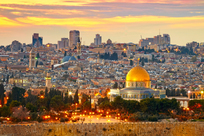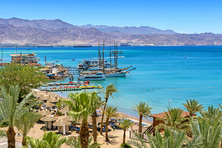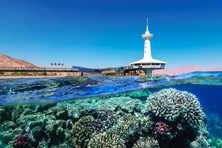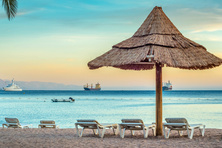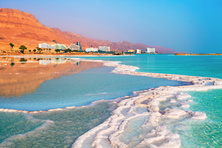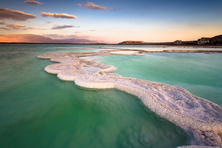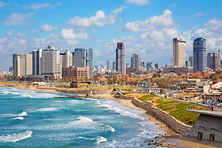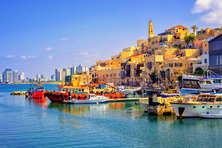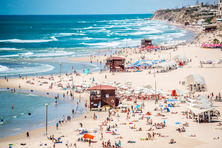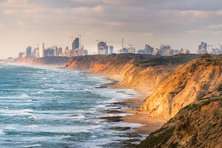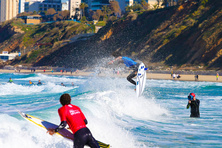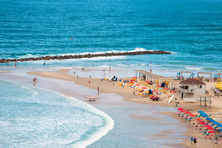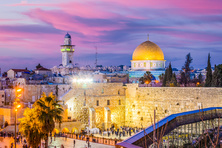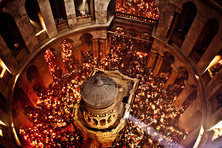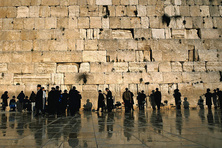Israel
- Capital:Jerusalem
- Currency: Israeli new shekel
- Time: UTC+2, summer UTC+3
- Languages: Hebrew, Arabic
- Religions: Judaism
- Sections: Get in Visa Customs Cuisine Money Details of interest Popular resorts
Israel is a state in Southwest Asia. It is washed by the waters of the Red Seam, the Mediterranean Sea, and partly by the Dead Sea. Israel shares its borders with Egypt, Lebanon, Syria, and Jordan. The capital city is Jerusalem.
The climate in Israel Mediterranean subtropical. The most comfortable months for visiting the country is April, September, and October.
The official languages are Jewish and Arabic. Many people speak French, Russian, Spanish, and Amharic. The majority of the population practice Judaism.
The resorts in Israel are very diverse. The tourists who prefer beach holidays should choose the resorts on the Mediterranean coast. They are Ashdod, Bat Yam, Ashkelon, Herzliya, Nahariya, Netanya or Haifa. Some of them offer all the facilities for yachting, surfing, and kitesurfing. Eilat is very popular among the fans of diving, snorkelling, and sea fishing.
Religious tourists and pilgrims go to Hebron, Galilee, Safed, and Jerusalem.
Well-being tourism is well-developed on the Dead Sea resorts. For example, Arad is known for its healing muds, Hamat Gader can offer hot springs. The tourists can also visit the rehabilitation centre Ra’anana.
In Israel, the tourists can see the craters Mitzpe Ramon, the caves Modiin-Maccabim-Re’ut and Beit Shemesh.
Excursion tourism is developed in Beer Sheba, Dor, Caesarea, and Yeruham. In these cities, there are many historical and cultural monuments.
Rosh Pina and Metula is a destination for the out-of-town tourism. And those who prefer city entertainments, night life, and shopping should go to Tel Aviv. Due to industrial manufacture and educational institutions Rehovot became a centre of business and educational tourism.
Get in
By Plane
Transaero, Aeroflot, Utair, and El Al offer direct flights from Moscow to Tel Aviv. The airline Rossija offers flights to Israel from St. Petersburg.
The citizens of Ukraine, Armenia, and Belarus can fly with UIA or Arkia from Kiev, Yerevan, and Minsk All the rest CIS citizens will have to take transit flights.
There are direct flights between Israel and all large European cities. The flights are offered by Air Berlin, Transavia, Air Europa, Climber Sterling, and Wizzair.
By Ferry
There is a cruise ship departing from Limassol to Israel. The tickets can be bought at the companies VarianosTravel, Rosenfield Shipping, and Salamis Lines.
By Land
There is a regular bus running from Jerusalem to Amman and Nazareth.
Visa
The EU tourists do not need a visa to travel to Israel provided that their stay will not exceed 90 days. A visa-free regime is also available for the citizens from Russia, Ukraine, and Georgia.
All the others have to submit the documents for a visa to the Embassy or the Consulate of Israel. Normally, it takes 7 working days to issue a visa. A visitor visa is valid for 3 months.
Customs
The Customs legislation of Israel does not limit the import of foreign or national currency, but the sum exceeding 100.000 shekels (ILS) must be declared.
It is allowed to import the following goods duty-free:
- personal clothes, shoes, perfume, and jewellery;
- used gadgets and equipment without a package;
- travel gears and sports equipment (except diving equipment);
- musical instruments;
- some alcohol and tobacco;
- baby food in reasonable quantity.
It is strictly prohibited to import:
- rare and dangerous animals and fighting dog breeds;
- pets without a vet certificate and pets as young as 4 months and less;
- seeds and package from the seeds;
- equipment for bee-farming.
The tourists are not allowed to export:
- antiquities (without a special permission).
Cuisine
The Israeli cuisine is a mix of cooking traditions of the world cuisines, but with a kosher twist. The Israeli people eat a lot of fruits and vegetables, fish and meat, beans, and olive oil.
The foodies will want to try a lamb Kebab, a meat and potatoes stew Cholent with beans, chicken stewed with a beef tongue, meat rolls and forshmak, minced meat Albondigas and meat rolls Osban stuffed with rice, spinach and herbs.
In Israeli eateries, for breakfast, you will be served Shakshouka, a dish of eggs poached in a hot sauce.
The lovers of seafood will have a chance to try stewed perch or halibut Hraime and grilled Saint Peter’s fish.
The Israeli cuisine is rich in various soups. Do not miss a chance to try Meorav Yerushalmi (savoury chicken soup with liver and hearts), Marak Regel (beef soup), Maraq ‘Adashim (lentils and tomato soup), and a soup Shkedei Marak with pasta.
A traditional side dish in Israel is mashed eggplants Baba ghanoush, potatoes and egg pie Kugel, and Kubba bamia with rice, semolina or okra.
The tourists like such salads as Tabbouleh, Masbaha, Hamusim and familiar to the Europeans Greek salad.
Instead of bread, the Israeli people prefer unleavened flatbread Matzah, Pita or Mofletta.
At the end of the meal, treat yourself to some cookies Tahini, baklava, halvah, and pudding Mahallebi which is served with tea or coffee.
We also recommend trying such wines as Jordan and Karmiel.
Money
The official currency of Israel is the Shekel (ILS) which is equal to 100 agoras. The Israeli use the bank notes from 20 to 200 shekels, 5 to 50 agora coins, and 1 to 10 shekel coins.
The tourists can exchange the currency at banks and in exchange offices. One can also exchange the currency at the airports, but the rate is very high there. Many shops accept US dollars, but again the rate is not good.
In large cities, you will find ATMs almost everywhere. Cashless payments are accepted virtually in all places. Only in distant regions the tourists can face problems with paying with their credit card.
One can cash traveller’s checks in special bank offices.
If you provide a touristic receipt or an international passport, you will not be charged to VAT when paying for your hotel booking, rent services and services of the travel agencies.
The tourists can refund VAT provided that they purchased the goods for the sum of, at least, 400 shekels in Tax Refund or Tax-Free shops. To refund VAT, the tourists should provide packaged goods, Tax-Free form and sales receipt.
Details of interest
Sightseeing in Israel
The lovers of cultural and historical sights will have a chance to see 8 UNESCO sites.
- The excursion to the Ancient fortress of Masada situated on the rocks near Arad includes exploring the palaces’ ruins, a synagogue, armament depot, and other buildings. The tourists can reach the fortress by the cable way or a Snake trail.
- Visit the Old City of Acre and see 60 temples and monasteries, fortresses, the Magic Garden, the inns, and the Templars’ Tunnel.
- Excursions to the White City of Tel Aviv are also very popular among the tourists.
- The Incense Route includes such ancient cities as Haluza, mamshit, Shivta, and Avdat.
- The pilgrims should not miss a chance to visit the Biblical Tels such as Hazor, Megiddo, and Beer Sheba.
- All the tourists will be impressed by the Bahai Holy Places in Haifa and Western Galilee. The most popular place among the religious tourists is the Old City of Jerusalem with the Wall of Tears, the Holy Sepulcher, and the Al-Aqsa Mosque.
- If you like archaeology, you should definitely visit the Caves of Maresha and Bet-Guvrin in the Judean Lowlands.
- Another interesting place is the Sites of Human Evolution at Mount Carmel — The Nahal Me’arot Caves. These places preserved the evidence of the life of people since the Iron Age.
In Israel, there are also 17 UNESCO candidate sites. We recommend visiting the Sea of Galilee and its ancient sites, Early Synagogues in the Galilee, and Triple-arch Gate at Dan & Sources of the Jordan. The tourists can also see the Galilee Journeys of Jesus & the Apostles, Bet She’an, Arbel, and Horvat Minnim. The White Mosque in Ramle and the Mount Karkom are very impressive.
Make your holidays in Israel useful and visit the Bible Lands Museum, the Museum of the History of Jerusalem, and the Tel Aviv Museum of Art.
Souvenirs in Israel
In Israel, you can buy the following gifts and souvenirs:
- cosmetics with the Dead Sea minerals;
- icons, crosses, and anointing oil;
- jewellery;
- traditional clothes and kippah;
- candles and candlesticks.








